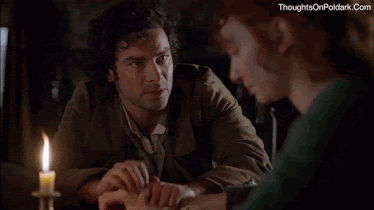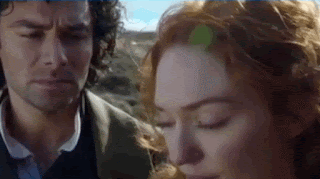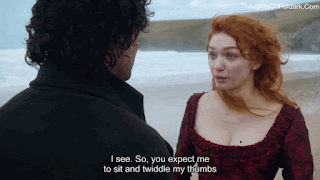
Following Ross Poldark's fall from grace when he forced himself sexually on Elizabeth on 9th May 1793 and brought about the near break up of his marriage,
it was on the 24th December of that year that Ross and Demelza had an epically romantic reconciliation. It therefore made this an extra special Christmas Eve and a happy ending to the first four books which serve as a first set in the saga.
In a storyline based around a love triangle with Ross as the main character who was conflicted by an apparent love for two women, within the narrative, Demelza, his co lead character, and Elizabeth had by virtue of this been put in a position of competition with each other for his heart. The reconciliation and the words Ross used to express his feelings, in essence saw Demelza finally declared that Christmas as 'the winner' of all of Ross's love. However a frequent query requested has been around the issue of whether it was truly a happy ending for Ross and if he just settled for less.
Whilst a series of posts to follow will explore in more detail the exact reasons why Ross chose Demelza over Elizabeth, this one will explore in two parts the genuineness of Ross's choice of Demelza. Therefore the question of whether he chose Demelza by default. Together with quotes and explanations from Winston Graham there are many points and themes in his writing which convey this was not the case. In this part one the focus will be on Ross's discovery of his feelings which swayed in Demelza's favour and part two 'Reassurance and Reaffirmations Of First Choice' will focus on how the honesty behind Ross's choice is reflected in various ways through his words, the heartfelt romantic declarations he made to her and his thoughts and actions as cited below, but also thereafter in the saga. That will include his thoughts and meeting with Elizabeth again.
A Happy Ending Or A Tolerated Sacrifice?
This epically romantic final scene at the end of the fourth book
'Warleggan' (which as portrayed in the last television adaption did not in the books take place on a cliff edge but instead with Ross and Demelza at Nampara soaked in beer and a little rain drenched too), seemed very much a happy ending. Winston Graham referred to it this way himself. He had said in interview that the first four books were one long story divided into four and told Argos Weekend Magazine in 2001 that
"I wanted to do a love story with a happy ending and that was it."
If Ross was still in love with Elizabeth in much the same way as before, or even still a little less, but still in love, then his decision to choose Demelza would be one of him going forward still with an ongoing, unfulfilled and sacrificed love for another woman. Perhaps with a more 'tolerating' outlook and just accepting what he had with Demelza. The default option! It would have essentially been him settling for second best or otherwise him still choosing to lie, deny, minimise and then set aside what if true would have been his ongoing and never really changing love for Elizabeth. That certainly would not have quite been a real happy ending for either of them, since one is being a little untruthful (Ross) and the other is being fooled or buttered up with half truths (Demelza). This would be that Demelza was the one he ultimately wanted without any shadows of an ongoing love for another woman.
So with that said the idea of a true happy ending must surely be based on Demelza really being Ross's first choice and not on an untruth that she was first choice when she was really still second best, or on par. Or also that Ross was no longer in love with Elizabeth when he still was. If Winston Graham considered it was a happy ending then it is likely that such half truths by Ross were not told and there is much to show this was the case.
A Case Of 'I Love You Yes, I love Her Not.'
"...the one sure feeling that stood out was that my true and real love was not for her but for you." Ross to Demelza ('Warleggan' Book 4 Chapter 7)
To start with, on this issue of whether Demelza was really Ross's true and first heart's desire after his night with Elizabeth (hereafter, 'the May incident'), the basis for why Ross ultimately chose Demelza lies within Ross's heartfelt declaration to her that Christmas Eve. This gets to the root of the matter. It is here that Ross expressed his realisation that his 'true and real love' was for Demelza and not for Elizabeth. This does invite another discussion in the first instance about the 'un-realness' of Ross's feelings for Elizabeth. This perhaps explains even more so the additional emotional logic behind his realisation. However, for now it is these words from Ross to Demelza on that special night that do essentially answer the question of why he chose her over Elizabeth. It also answers the question of whether Ross settled for less since a 'true and real love' is not second best and it could not be 'settling' to choose such a person over someone who is not this. That even still applies if perhaps Ross did still love Elizabeth, but to a lesser degree.
An Author's Nudge-The Woman Ross 'Really' Loved
If doubt persists, then what provides some further reassurance about Ross's declaration is that in his capacity as author of the story Winston Graham seemed to validate and ratify the truth of Ross's declaration of a true and real love only for Demelza. This was in an interview he gave to the 'Opelousas- Daily World' newspaper dated 25th June 1978 and which was called 'Winston Graham Goes A Second Round'. As shown in the image (below) he is quoted as saying that "I wrote four novels...-from 1947 to 1953..They completed a cycle: the relationship between Ross and Elizabeth. It's the story of a man who is deprived of the woman he loves, then discovers once he has her, that he is really in love with his wife." (edited)
This and in particular the reference to a 'discovery' makes it clear that 'the May incident' for Ross was a watershed moment for him and his outlook on his feelings for Elizabeth. This is because it was this incident that helped him to measure his feelings for both women against each other in the most rawest down to the bone way. This is not inconceivable for a man who finally sleeps with a woman he had longed for and fantasised about for years. The event would always be measured against his expectation and against how it feels with his wife and also the feelings for this woman following the event against his feelings for his wife.
It was the sentiment of Graham's comment about Ross making a ‘discovery’ from this 'May incident' that was echoed in Ross's grand speech to Demelza at the end of 'Warleggan'. This was exactly where he expressed that in holding up his idealised relationship with Elizabeth against his ordinary and imperfect one with Demelza, it was not his one with Demelza that suffered in the comparison. It is therefore clear that although it was not immediate, 'the May incident' really did help Ross come to a new and greater understanding of his feelings and what a realer and truer love was for him. And for whom of the two that he held it for.
A 'Discovery' of the The Unreal
On this issue of Ross's 'discovery' (as stated by Graham), it is important to be clear that at this point six years into his marriage with Demelza, Ross did not just 'discover' that he 'really' loved her then. He already knew that from when he fell in love with her weeks after their marriage. This love was reaffirmed by him and the narrator a number of times afterwards. The 'discovery' was really about the differentiation between the kind of love he had for Demelza and the kind he had for Elizabeth, as stated above when measured against each other. He found a distinction and comparison of real love with his wife against an unreal one for Elizabeth. That one he realised had been based on idealisation. Therefore the key 'discovery' was that of the two his love for Elizabeth was not a 'true and real' one. This is why Elizabeth was left out of the equation when Graham said Ross discovered he was "... really in love with his wife." It would have only emphasised the message even further to have added the words " ..and not Elizabeth." However this was done simply by Graham's omission of Elizabeth's name in relation to who Ross was really in love with. On the other hand he did also write Ross's own clarifying declaration that "...my true and real love was not for her but for you."
A Man Governed By Feelings
"I am trying to think hard of what you've said, to be- rational about it instead of emotional. D'you know you're the second person in two weeks to accuse me of making emotional decisions." (Ross to Caroline 'The Angry Tide'- Book 3 Chpt11 (3))
When it came to the option of splitting with Demelza and choosing Elizabeth instead, two main issues would be involved to direct Ross's decisions. His feelings and what was practical and dutiful. On this Ross seemed to show that he was inclined to be led by his feelings and innate longings. It was this that troubled his quiet and private reflections. Meanwhile, Graham did not convey in his writing that duty and doing what appeared to be the right thing was a matter of great concern to Ross. It still could be assumed that Ross settled with Demelza because it was the easiest and less disruptive thing to do. Also out of practicality and a sense of duty not to break up an established home and for the sake of their child, Jeremy. However to think Ross's character would make such a monumental decision on such a matter of the heart, out of duty and for the 'safest, least controversial option', is to wildly misunderstand the character that Ross Poldark was. Whatever the case, a key point is that Graham never ever narrated that these were Ross's reasons in his choice. His own comment on the matter only referred to Ross's 'discovery' in his comparison of feeling for the two women.
An Emotional Decision Maker
Unlike the characters of Elizabeth and George who were more practical and calculated in their decision making, there is no doubt that Ross (like Demelza was to a degree) was a man that acted on his feelings. It was something that was well commented on by those close to him in the books. This included his own wife Demelza, Verity, Dwight, Caroline, George and even high society gentlemen.

Ross often making key decisions based on feeling and not logic was evident from the beginning of the saga in his impromptu but not necessarily rational or cautious decisions. For instance, not to mind his business saving a street urchin from a dog fight, offering her a home and employment that very day, fighting her father for her whilst not being sure if the law was even on his side to keep her, marrying her with half a mind on snubbing his society, breaking into two prisons to save a friend including one in another country, turning his back on a paying mine to escape George and banking on what seemed a defunct one instead, taking Elizabeth sexually by force in sudden anger at his perceived betrayal of him by her and refusing to listen to Dwight's logic in disapproval as Ross partook in a duel without even informing Demelza. All because of an insult paid to her and his long running emotion of jealousy regarding her attachment to a man who was no longer even alive.
Indeed Graham crafted Ross's character as a non conformist driven by emotions. His recklessness in following his passions and his heartfelt desires mainly for worthy and good causes often gave Demelza anxiety. However not following his heart on matters would leave him in a state of agitation. In the quote above with Caroline, Ross was considering her advice about being more rational than emotional whilst remembering that Lord Falmouth had picked up on the same apparent fault in his nature and warned him saying "You must be logical in life-not emotional."
Demelza Over Elizabeth -Ross Following His Feelings
First Stop-Wanting Demelza To Stay
Even Ross burying his head in the sand with Demelza for months after his night with Elizabeth was a stunted emotional response rather than a logical one. However before then Ross did actually make approaches to an angry and upset Demelza in the near aftermath of his infidelity where her rebuffs discouraged him from following through with his feeling and his pursuit of her. Nevertheless on this matter of the heart in his relationship crisis, ultimately his final choice of Demelza was based on pure emotion.

Contrary to the last television adaption where Demelza was shown repeatedly and angrily suggesting Ross should leave Nampara to live with Elizabeth, in the original story of the books it was Demelza who suddenly made a serious proposal that she should leave Ross. This was some six days after his incident with Elizabeth. He had approached her to talk things through. He discouraged her suggestion saying "I don't believe there's anything to be gained by trying to do the right thing or the wrong thing in a situation such as this." Instead he encouraged a different way saying "We can only follow our own feelings so far as they lead and judge from day to day." Here Ross was not advocating they should act on duty and logic and therefore also by trying to please others, but instead he was advocating just following the heart. This is just as he did here. Demelza's suggestion was unexpected. It had alarmed and unsettled him. Despite her practical suggestions with amicable arrangements for her to leave, find work and allow Jeremy to remain with him for a while, he felt to say and did ask and express "I don't want you to leave if you're willing to stay." That reflected what his early innate feeling was. He did not want her to leave. He did not want to take the freedom she offered him to go to Elizabeth. He did not want separate with Demelza. That was him following his feelings.
A Need For Demelza

Even though Ross shirked away from confrontation with Demelza for a while thereafter, there are a few things during their live in separation which indicated that over those months he was processing and coming to a greater awareness of his feelings. It is apparent in time that this pertained to his feelings on Elizabeth for which he was unsure and not his feelings on Demelza, for which he was sure of. Graham wrote at one point that in relation to Elizabeth 'For a long time he had been quite unsure of his own feelings; then they had crystallized.' He also wrote that after the discovery of large amounts of tin in Ross's mine, though Ross then had more money to spend 'He also needed Demelza to help him savour it..' After some six months of frostiness in their separation, though not shown in the television adaption Graham wrote of Ross's pleasure at the slight warmth returning to Demelza's voice when on a shopping trip together and of his pleasure at their close proximity when sharing a horse riding into town and back.

Crucially, immediately after Ross and Demelza's November shopping trip and while he was obviously talking about their separation Ross seemed to absentmindedly echo his thoughts to her that "..we don't ever regain what we lightly lose." He added that for them it was "...lost to no good purpose." That was rather significant as it indicated that he felt Demelza's value to him was greater than his experience with Elizabeth, which had been the thing that caused him to lose Demelza in the first instance. It is an indication that at that time or some time beforehand he had been clear that Demelza was of more meaning to him than Elizabeth. The source of his emotional distraction and pull was Demelza and not Elizabeth.
A Feeling To Rebuild With Demelza

Indeed Graham's writing swayed to him building a picture of Ross's emotions being closely tied with regret at his separation from Demelza, a wish to rebuild life with her and a need to know she still cared for him. For instance, after his fight with George which yet again in the saga was due to his violent and emotional reaction to George insulting Demelza (by calling her a 'scullery maid'), when dealing with his injuries he asked a visibly distressed Demelza if she still cared for him. It was after her reassurances to him on this that he pressed her to go on that shopping trip with him where he then bought some items for her with '...the purpose of tempting Demelza into a new attitude of mind.' What is significant is that during this period Graham did not counterbalance this with any conflicting narrative of emotion highlighting that Ross also had a longing or need for Elizabeth. He put Ross's focus on making headway with Demelza and trying to win her back.
Elizabeth- Very Much Down In The Arena, Not Up
Indeed, if Ross's feeling for Elizabeth were of ‘true and real’ love, his experience with her should only have confirmed this and actually enhanced further what would then be a powerful undeniable emotion. That emotion would be dominating for Ross. It would require some effort to contain it and as a fundamental issue and story point the narrator would share that this was what Ross was doing. Instead Graham's narration established an undercurrent of Ross downplaying his discovery from his night with Elizabeth. This was in respect of her and an element of there being something underwhelming in his romantic feelings for her.
A Pedestal For A Fantasy Woman Gone?
From being on a pedestal as the perfect, perhaps ‘fantasy woman’ it is meaningful that Graham chose to write that Ross thought his experience with Elizabeth brought her '...very much down into the arena.' This does not give the impression of this fantasy ideal of her being confirmed by the experience. It doesn't suggest that she, as such a fantasy woman in the experience was uplifted far above and against Ross's lovely but normal wife. So with this it is easy to understand why Graham wrote that this did not simplify things for Ross and that he '...could not evaluate his own feelings yet.'

The latest television adaption (2015) featured a scene with freshly created dialogue between Ross and Demelza that therefore was not from Graham's original story and was where Ross told Demelza that regarding his feelings it was not a question of not wanting her but rather of not wanting Elizabeth. He then indicated that he did not know if he did want Elizabeth or not. At first glance this seems a bold insult to Demelza but it does reflect the book narrative and is not actually to Elizabeth's credit. Ross's love and desire for Demelza had never been in question but in the years before 'the May incident' his happiness with Demelza had caused the strength of his feelings for Elizabeth to shift a little. In 'Demelza' when she was in labour with Julia he wondered if he still did love Elizabeth. In 'Jeremy Poldark' he wondered if they would have been happier together if they married and thought their personalities might make life together difficult. Then after Elizabeth's 'Vague Confession of Love' he found he liked her less and had warmer feelings for Demelza. Nevertheless Ross had had a ten year devotion of wanting Elizabeth but after his night with her he was no longer sure or as certain if he wanted her after all. If she, the experience and the feelings with her that night had lived up to his idealised visions and perfect imaginations of what it would be like with her and they so clearly exceeded what all this was like with Demelza, it would very likely have been the other way. Of him wanting her all the more.
Elizabeth: An Unexpectedly Less Exalted Rival

It is important to remember that Ross's night with Elizabeth involved forced sex. This is at least in the first instance. That makes this unsavoury. However this is an examination of Ross's character's feelings of the experience. They are based on his own perhaps one sided outlook. That very much contradicts with Elizabeth's because whilst admitting he took her by force, Ross's outlook (possibly due to lack of awareness or self denial) includes that it was not so much against Elizabeth's will and that the experience 'for him' was 'pleasurable' (as he later confessed it was). Even though Elizabeth may not have found it so that was how he experienced the incident and his feelings were based on this. Demelza in fairness challenged Ross suggesting that his manner with Elizabeth meant that she was taken by surprise and putting her at a disadvantage was possibly reluctant to perform well due to her marriage promise to George. She supposed for fair judgment that Ross should have persevered. Sarcastic responses from Ross and what Ross had already conveyed indicated that for him the experience taught him enough and he simply did not want to persevere with Elizabeth. Whether it was fair or not to Elizabeth for him to feel this way and compare his feelings on both women in those circumstances, this was Ross's feeling. It is most likely in any event that Ross's feelings were not based on sexual performance but more about his feeling of a emotional/spiritual connection with Elizabeth. The incident did not leave a feeling of unfinished business and uncertainty for him. When it came down to it the eventually pleasurable experience (to him) did not tempt a feeling in him for more and Demelza was not the obvious second preference she and perhaps the reader thought she'd be.
Elizabeth meeting Ross's idealised expectation would undoubtedly have simplified things for Ross. With a feeling of her being way out in front of Demelza that would have made it a clear cut matter for Ross. However for Ross his feelings did not place Elizabeth as exalted very well above Demelza after all. The reader would learn from Ross later that it had been much the other way when Ross explained that the experience and feelings with Elizabeth fell short when measured against what he had with Demelza.
Demelza Never Really The Underdog
Ross's experience and feeling with Elizabeth falling short of expectation makes it all the more a reality that the ‘competition’ as such (for Ross’s heart) could end up being much more of an even one than the reader might have thought it would be previously. In fairness, Elizabeth having a lot to live up to, not only against a wife we know Ross did love, but also against this dream woman vision he had set up for her, arguably this made it a 'competition' that was probably always more in Demelza’s favour (see upcoming post ‘It Was Always Demelza -Why Ross Chose Demelza Over Elizabeth’).

Ross’s pleasurable but ultimately underwhelming experience (since he later explained something was missing from it), together with his passive feeling towards Elizabeth after the incident, perhaps explains his lack of action towards Elizabeth thereafter. Also it explains why six days later Ross said to Demelza after she was suspecting that he had gone to see Elizabeth that weekend, that this was not true and "I never had an intention of going." He stayed consistent thereafter in not making any move or being narrated as having any feeling to go to Elizabeth. This is except after on an unknown date before December when his thoughts had crystallised on the matter. Even then he thought it was too late and we find that it would not have been to be with her. But still, way before then, such as when returning from his night with Elizabeth, Ross had acted as if they would hear news of Elizabeth’s marriage rather than him indicating he would seek this information out or do anything further about this himself. So he never took any action or went to see her. It is significant that whatever Ross's feelings were, very early on he did not have a feeling and intention to go to Elizabeth during the period when she was technically still available for the taking. Or afterwards! As demonstrated earlier in this piece we know that when Ross did have a feeling he could barely contain himself from following through with this even when it was completely irrational and good counsel such as from Dwight sought to persuade him otherwise. Even when it might great upset his wife. Such as a secret duel that might have got him killed or an anonymous payment by him of much needed £600 given to his first love instead of used for his own family. All because of his feeling to honour an ethical debt.
A conversation between Elizabeth and Ross which took place three years later in the sixth book had Ross tell her that he could not leave Demelza for her. This can be misconstrued as Ross implying that he only stayed with Demelza because he was unable to leave her. This will be addressed in part two of this post topic but as can be seen here, the important context is that he did not want to go and see Elizabeth, did not have a feeling to leave Demelza for her and wanted Demelza to stay when she suggested going herself.
Elizabeth- A Feeling For Her Of Lesser Importance
As a man of emotion if Elizabeth was Ross’s true heart’s desire then presumably such powerful feeling would have at least been distracting and regrettable. Especially if this was to be sacrificed for a lesser option. However in Ross's focus on Demelza and failure to even go to speak to Elizabeth to talk it through or clear the air, he treated her of lesser importance than his honourable principles should have allowed him to. He himself admitted that 'It was unthinkable to leave the situation as he had left it... and that on that May night 'He had behaved abominably..' towards her.
Ross deliberated that he did not visit Elizabeth to begin with because '..he did not know what to say, and the impossibility of explaining himself had stopped him.' This again indicates no clarity for Ross on his feelings for Elizabeth. No strong, overpowering and explanatory emotion to assist and guide him. That includes not having a strong feeling of love for Elizabeth which would pull him to her direction as well as be the very explanation for why he did what he did on that May night. Yet in comparison he later told Demelza that all the while the one thing that had stood out for him was his true and real love for her. It is likely that this, (as he explained in the act of following his feelings), saw him seek Demelza out after six days to talk and then to encourage her not to leave him as she proposed. When in December Demelza was ready to talk, with Ross being clear she was his 'true and real' desire he essentially highlighted the comparison of priority between Demelza and Elizabeth to him when saying "What I feel for Elizabeth now is of small importance.." Ross was desperately consumed with fighting for his real love. That was more important to him.
George: A Greater Upset To Ross Than Elizabeth
One big indication of Ross's feelings on Elizabeth was in September some four months after 'the May incident' and when Elizabeth had been married to George for three months. Ross said that in his own way he had been fighting out feeling on Elizabeth which Graham still did not define. However Ross did remark that Elizabeth and George moving into Trenwith (which represented his ancestral home), was to him "...a crowning indecency." He clarified that rather than fretting over Elizabeth "That has been my trouble all this week." So whatever Ross had been fighting out regarding his feelings on Elizabeth it was clear that hurt and pain at George's presence in his family home was a more sharper and pressing emotion than his feelings for Elizabeth.
Elizabeth: A Confirmed Stranger And Enemy
'He glanced at Elizabeth. Seeing her had upset him in a new way." (Narrative of Ross 'Warleggan' -Book 4 Chapter 6)

When Ross finally saw Elizabeth it was on Christmas Eve at Trenwith where he had gone to confront George about the injury caused to Demelza by his game keeper for crossing Trenwith land. Graham wrote that Ross was upset in a new way upon seeing Elizabeth. The reasoning might have remained mysterious except that Ross explained in his speech to Demelza later that day that his feeling of not loving Elizabeth was confirmed by this meeting. The reader will note Graham's narration that Ross was surprised by the level of her animosity towards him but he expressed to Demelza that she was like a 'stranger' to him and even an 'enemy'. The fact that his pre-existing feeling for her was 'confirmed' at this meeting suggests that Ross's pre-existing feeling for her had been something of this kind. Linked to her as a stranger or enemy. This likely relates to a deeper issue to be explored in an upcoming post about the concept of Elizabeth as his 'Greatest Friend' and how despite his attack on her in 'the May incident', from the outset of the story there had already been a long running theme of her disloyalty by her to him and of her letting him down. However in this alliance with George and this final scene where Elizabeth proved herself in that meeting to be the loyal wife to his greatest enemy (George) and seeing her standing firmly against him with George, his disappointment that she was not the person he hoped was confirmed.
The Missing Spark For Real Love
"...It's the ultimate spark between two people that lights the flame.." Ross to Demelza 'The Angry Tide' Book 1 Chapter 3)
Ross's disappointment in Elizabeth and his detachment from her as a person now perfectly explains why in the months before he struggled to feel a 'real and true' connection of love for her. However though this concept of her as a stranger and now an enemy was a trigger to help Ross realise he was not 'really' in love with her, there is so much more to his overall feeling of not loving her. This will be explored in the 'Why did Ross Choose Demelza Over Elizabeth?' series of posts to come. However to be cliché it was Demelza who had a perfect blend of all the ingredients in a woman that struck and connected with Ross and lit his flame. This is what Ross said to Demelza that she was to him in the seventh book 'The Angry Tide'.
Another Discovery Of First Choice
Based on the indications in Graham's writing in respect of Ross's feeling, it is clear that whilst Ross was initially confused on his feelings for Elizabeth, before and after they crystallised his heart and mind was always with Demelza. Accordingly his declaration to her was indeed genuine. Readers learned that his love for her always stood out to him. Whilst Ross was able to feel bad that he had treated Elizabeth abominably, Graham did not report him feeling a heartache over not having Elizabeth or going to see her. This therefore does not accord with Demelza being the second and default option. Demelza may have been Ross's second choice when they married but his discovery from his night with Elizabeth was now, not just that his love for Elizabeth was not real but that Demelza was now his first choice.
The processing of Ross's feelings is one thing that highlights the genuineness and authenticity of his choice of Demelza but the follow up post 'Reassurances and Reaffirmations Of First Choice' provides even more. This is with the focus on Ross's pleadings to Demelza over ten pages in the final scene and other indications in later books including in his later thoughts and interactions with Elizabeth.
Other Blogs That May Be Of Interest
The Magic of the Fall in Love (Pt4 Ross And Demelza: The Love Story)






























